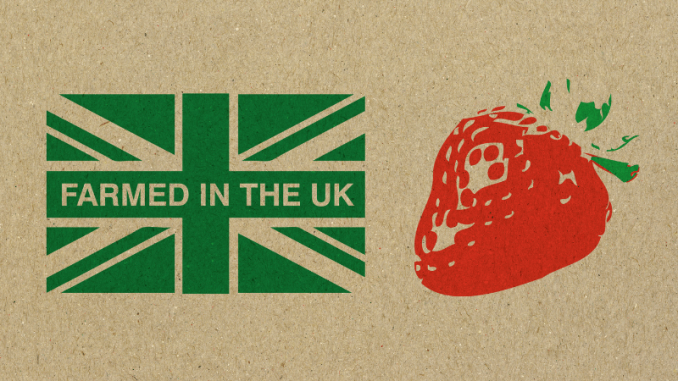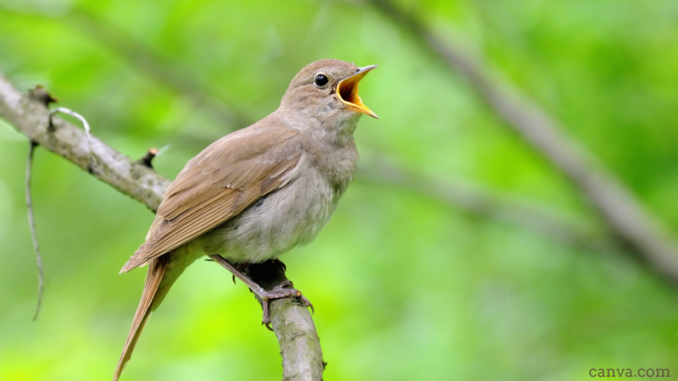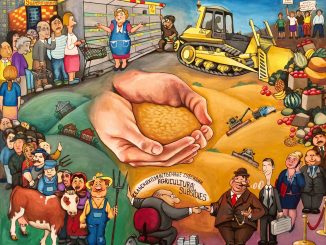
In post-Brexit Britain, the new Agriculture Bill is exposing the fault lines between environmental conservation, neoliberal trade deals, and the future of small-scale farming. In part two of this series, Anoushka Zoob Carter explores the phenomenon of technological nationalism in post-CAP politics, and the conflicts it is generating between advocates of rural renewal and of an emancipatory rural politics.
As the UK parts ways with the EU’s Common Agricultural Policy (CAP), a new legislative framework has been generated to overhaul the CAP subsidy system and replace it with the principle of ‘public money for public goods’.
Much of the campaign to leave the EU utilised nationalist rhetoric to ‘sell’ Brexit to those concerned with agriculture sector, as I argued in more detail in my previous article. Alongside food production, promises were made to renew the British countryside and revive British soil.
A conflict is now becoming increasingly visible between a ‘Green Brexit’ and ‘taking back control’ of agricultural policy.

Green Brexit
Ecosystems in the UK are in dire straits. National parks were described by the head of the Royal Society for the Protection of Birds as “where wildlife goes to die”. Unlike many other countries, agricultural activity occupies a substantial area of UK national parks. Addressing the ecological crises, in part by shifting approaches to agriculture, could help revitalise some of the many beleaguered species such as wild orchids, the pine martin and the nightingale.
Described as part of the fabric of the national identity, Boris Johnson recently announced that £40 million (€44.68 million) will be funnelled into ‘green spaces’ as part of a plan to achieve net-zero emissions.
The countryside was integral to populist narratives around a ‘Green Brexit’. The British ‘people’ were portrayed as custodians of the nation’s ‘natural’ assets and British ecology and British identity were connected by the likes of the Conservative Environment Network (CEN) who stated that the countryside, like the NHS, makes people proud to be British.
However, 70% of British countryside is occupied by farmland, so the fact that agriculture is neglected by the ambitions of the net-zero plan is rather curious.
The UK now has a new Agriculture Bill (AB) which focuses on promoting environmental public goods. In large part, this approach seeks to encourage and reward farmers who are in a position to restore their land to a determined ecological baseline. This signals a move away from the prioritisation of land-based payments – something that the CAP was heavily criticised for.
Whether or not this scheme will disrupt the privileges of the largely land-owning gentry remains to be seen. But beyond the discourse on reviving degraded nature, tensions between conservation and food production are becoming more visible.
Future of food and farming
The government’s Industrial Strategy is playing a decisive role in negotiating the future of food. Technology is poised, according to the Conservative Environmental Network manifesto, to amend the ills of agriculture and produce a triple win: grow the economy, enhance the environment and bring unity to a ‘divided country’.
This technological populism has invited a lot of attention and investment to lab-grown food and other alternative sources of protein. The Environment Secretary posited to farmers last year that lab-grown food could form part of a vision for Britain as leader of the ‘fourth agricultural revolution’. But the elite has clearly forgotten who bears the high cost of this revolution: the small farmers and landless labourers who have historically suffered the collateral damage of agricultural revolutions.
Moreover, whilst innovative agri-tech gets labelled with claims of ‘sustainability’ or ‘increased efficiency’, the Industrial Strategy’s commitment to ecology extends as far as previous technological revolutions have done in agriculture: to make the exploitation of nature as cheap as possible. Marx said that progress in capitalist agriculture is “progress in the art, not only of robbing the laborer, but of robbing the soil”. Today, are we witnessing a moment of food politics that is departing with soil altogether?
In his documentary Apocalypse Cow: How Meat Killed the Planet (2020), environmental journalist and activist George Monbiot depicts a farm-free future to address the ecocidal role played by agriculture in the British countryside. The vision of ‘nature recovery’ unravels to be one that pits techno-efficiency against farming as a practice.
The solution, according to Monbiot, is to develop lab-grown food or look to imports. The preoccupation with lab-grown food brings forth a rather paradoxical scenario where, to ‘recover’ nature, food production becomes disconnected from its roots in the soil.

A transition to lab-grown food implies that farming jobs will inevitably be lost in the UK, as was perhaps anticipated in a post-Brexit referendum speech by Michael Gove, the chief minister of DEFRA, who told farmers that the fourth agricultural revolution will entail some “tough choices”.
The unsustainable practices of monoculture and industrial models of high-input agri-extractivism need to end if we are to protect biodiversity. But the dominant land-sparing initiatives prescribed so far seem contingent on intensive agri-technology. This distracts somewhat from the need to address the way food production is valued and understood in society.
The UK’s Committee on Climate Change (CCC) warned of the implications of land-sparing risking further reliance on imports from elsewhere, described as ‘carbon leakage’. More bluntly surmised, this would be a continuation of the British colonial model of assuming that the nation will be fed by others.
The current vision for agriculture makes small-scale farmers fearful for the future and where they fit in. When, for example, the new payment scheme places more value on their role as conservationists than food producers, it raises questions around the identity of the farmer and agriculture’s place in nature.
An ecomodernist future paints a picture of farms that rather than symbolising the British countryside are instead helping to decimate it.
https://twitter.com/Neilrippon/status/1273273450673721344
“Taking back control”
As farmers took to their tractors to protest unfair trade deals on the streets, and the nation was urged to keep calm and Buy British, Prime Minister Boris Johnson brandished Australian chocolate biscuits as a populist prop to insist on a world where cheap, processed food is traded as cheaply as possible. This is what ‘taking back control of our agricultural policy’ looks like for Boris Johnson.
The way that Brexit is unfolding shows that its main aim is to ramp up agricultural productivity primarily for export, regardless of the social cost. UKIP, after having argued that the ‘small-scale and family farm’ was under attack by the EU, now sees the facilitation of cheap food imports as the golden future.
Behind the Brexit hype – and the distraction of agri-nationalism and releasing the UK from the ‘straitjacket’ of the EU – are trade deals that will largely benefit the profiteers of agri-capitalism. These trade deals move the UK further away from shouldering its fair share of emission reductions.
Sustainability is a political concept, and the restoration of nature cannot be facilitated by negligently outsourcing food production. The future of food in the UK cannot be one that offloads the terrible harms brought by industrial modes of agri-extraction to ‘save’ nature in the global North.
UK-based localised food circuits and agroecology have the potential to provide the UK with, according to the Land Worker’s Alliance, 80% of the country’s food requirements. There is burgeoning evidence that diversified agriculture can generate greater biodiversity, soil quality, carbon sequestration and so on.
But, disappointingly but maybe unsurprisingly, there has been insufficient attention in the AB to help make these alternatives a reality. Although the AB includes a food security monitoring programme, the trade deal currently in negotiation with the US also undermines any focus on domestic food production.
Moreover, the Bill doesn’t ensure the accessibility of the new environmental land management scheme to tenant farmers. These kinds of land workers could be excluded from participating in the scheme, either due to the terms of their agreements, or their lack of security of tenure. This highlights the need to completely reassess not just what is produced on the land but justice around access and rights to land that food is produced on, and who produces it.
Conclusion
Though the EU was blamed for the plight of farming and nature in Britain, the Conservative government does not wish to part with the ideological root that underpins the CAP: neoliberal agri-capitalism. The majority of Tory MPs essentially voted in favour of bringing cheaper food into the UK, which reveals the thin ground that populist campaigns tread on.
Farmers are expected to work in the best interests of nature whilst the country’s elite simultaneously negotiates better terms for itself, and to pursue the illusionary logic of the economic growth paradigm.
As I have outlined here and in part 1, the attempt to prescribe a regressive nationalism as the cure to agricultural problems has presented a host of false solutions that push food production to the margins of nature, or confine it to laboratories monopolised by corporations.
An antidote to this can be found in the outward-looking approaches to food systems that go beyond paradigms of infinite growth, and resist exclusionary, bordered ideas of ecology.
More on right-wing populism
Framing Farming – Nationalism, Food Security and Food Sovereignty
More on Brexit
Book Serialisation | Creating a New British Farming Food and Rural Policy
Post-Brexit Food, Farming and Fair Trade | Food safety and labelling
Post-Brexit Food, Farming and Fair Trade | Environment and Animal Welfare
Post-Brexit Food, Farming and Fair Trade | Migration and Trade





